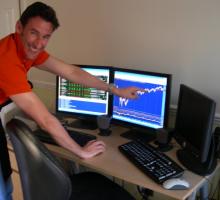Index investing is a form of passive investing that consists in archive the same return as a market index. Usually, it consist in purchasing shares of an index funds. Index funds are mutual funds that mimic the composition of a market index, like the S&P 500 or the Dow Jones Industrial.
When the market index updates it’s composition, the index fund updates it’s composition too. This way, the performance of the index fund will be similar to the performance of the market index.
Performance of the Vanguard 500 index fund and the S&P500 index

An index fund doesn’t need analysts or other people to choose what stocks to buy. No analysts means lower costs to manage the fund. This is why the expenses of index funds are really low in comparison with active investing funds. (Index investing is considered passive investing, whereas asset picking is considered active investing).
The market share of index funds have been growing substantially over the last years. In 1995 the market share of index funds was 4%, in 2016 it is 35%. The actual trend is to a bigger market share.
Some of the biggest index funds are:
1- Vanguard 500
It tracks the S&P500 index. The S&P500 is based on 500 large companies that lists their common stocks in the NYSE or the NASDAQ. The expenses ratio of the Vanguard 500 is only 0.05%. A typical active fund has cost that are between 1.3% to 1.5%.
2- Vanguard Total Stock Market Index Fund (VTSMX).
It is designed to provide exposure to the entire US equity market. It tracks the MSCI US Broad Market. This index covers about 3.300 US stocks (about 99.5% of the US stock market). This means that this index fund has a massive diversification.
3- Vanguard Total Bond Market Index
It tracks the Barclay’s Capital US Aggregate Float Adjusted Index. This index tracks all segments and maturities of the US fixed income market. The fixed income market is composed by bonds and other securities that provide returns that are known in advance, because the amount and schedule of payments are fixed.
4- Vanguard Total International Stock Index
It tracks the Vanguard Total International Stock Index. This index contains non-US stocks of large, medium and small companies.
Advantages of Index Investing
Index investing offers:
- High diversification
Higher diversification means lower risk.
- Low cost.
According to a study done by Morningstar (1), cost is the best predictor of the performance over the long term. They found that funds with low cost outperformed high cost funds.
¿Can anyone beat the market?
Active investing means to pick assets to try to beat the market. Active investing assumes that there are market failures that can be exploited. Passive investing is a strategy that consist in mimicking the market.
Another study (2) shows that if we include the management cost, the funds that actually beated the market were so few, that a random distribution of the performance could have lead to similar results.
Passive investment proposals, assure that managers and investors cannot consistently beat the market. The winner strategy over the long term is just to copy the market with low cost.
(1) http://news.morningstar.com/articlenet/article.aspx?id=347327&pgid=funda…
(2) http://faculty.chicagobooth.edu/john.cochrane/teaching/35150_advanced_in…




